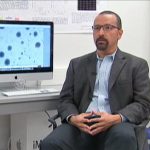
ORANGE COUNTY, Fla. (WOFL FOX 35) – Santimukal Santra and Oscar Santiesban’s work in this tiny UCF lab is not the most exciting to watch, but what the technique the students helped pioneer is. It could change the lives of millions who have inflammatory bowel diseases, like Crohn’s.
“[It] allows physicians to actually make diagnoses quicker and therefore put the patient in the corresponding treatment,” explains J. Manuel Perez, Ph.D., an associate professor at UCF.
Dr. Perez’s students are using nanoparticles to do it. The particles are so small the naked eye has no hope of seeing them. To give you an idea of just how small nanoparticles are, take an average paper clip. The end is about .8 millimeters. Nanoparticles are more than a million times smaller than that.
It’s complicated, but basically the technique embeds nanoparticles with DNA that will bind with the DNA of the disease. If it finds it, that binding will disrupt a magnetic field. If that happens, this machine sees it and the positive diagnosis is made.
Dr. Perez says the technique has applications that will help throughout medicine.
“Particularly physicians in diagnosing disease and treating, these diseases,” Dr. Perez explains. “Whether they are infectious diseases or whether they are other type of ailments like cardiovascular disease and cancer.”
The technique will also radically cut down diagnosis times.
“Sometimes it takes a week to tell the patient, ‘Yes, it’s a bacterial infection and it’s this,’ but our technique will only take a day maximum,” Dr. Perez says.
That should cut the cost of testing too and ultimately save you money, but more importantly, get you the help you may need faster.
Dr. Perez says it could take about five years before the new technique is available for widespread use in the medical community.
Reprinted from Fox 35 Orlando.